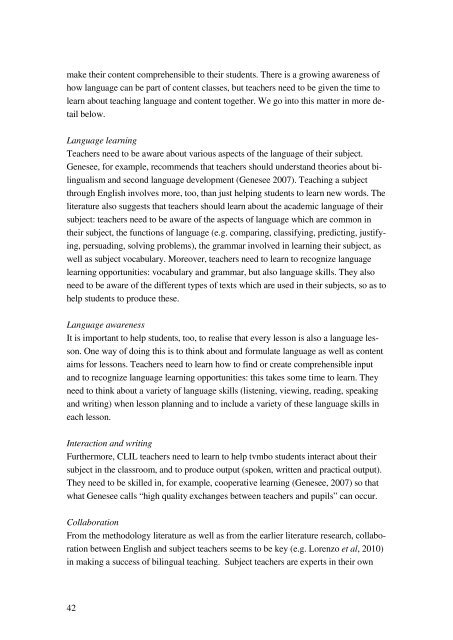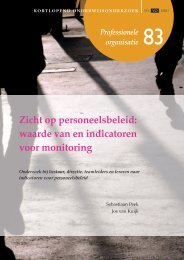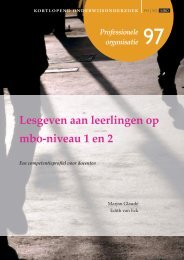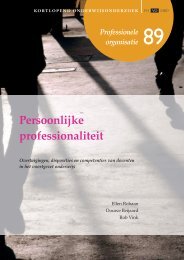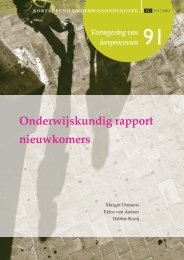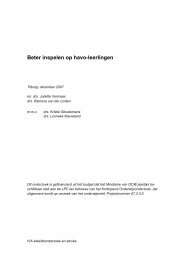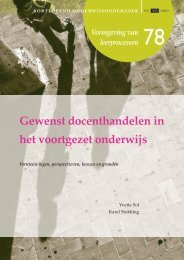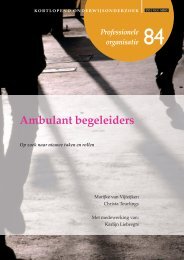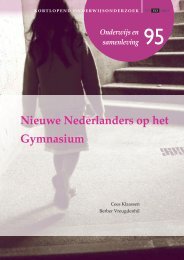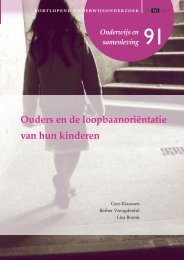Proud to be tvmbo - Kortlopend Onderwijsonderzoek
Proud to be tvmbo - Kortlopend Onderwijsonderzoek
Proud to be tvmbo - Kortlopend Onderwijsonderzoek
You also want an ePaper? Increase the reach of your titles
YUMPU automatically turns print PDFs into web optimized ePapers that Google loves.
make their content comprehensible <strong>to</strong> their students. There is a growing awareness of<br />
how language can <strong>be</strong> part of content classes, but teachers need <strong>to</strong> <strong>be</strong> given the time <strong>to</strong><br />
learn about teaching language and content <strong>to</strong>gether. We go in<strong>to</strong> this matter in more detail<br />
<strong>be</strong>low.<br />
Language learning<br />
Teachers need <strong>to</strong> <strong>be</strong> aware about various aspects of the language of their subject.<br />
Genesee, for example, recommends that teachers should understand theories about bilingualism<br />
and second language development (Genesee 2007). Teaching a subject<br />
through English involves more, <strong>to</strong>o, than just helping students <strong>to</strong> learn new words. The<br />
literature also suggests that teachers should learn about the academic language of their<br />
subject: teachers need <strong>to</strong> <strong>be</strong> aware of the aspects of language which are common in<br />
their subject, the functions of language (e.g. comparing, classifying, predicting, justifying,<br />
persuading, solving problems), the grammar involved in learning their subject, as<br />
well as subject vocabulary. Moreover, teachers need <strong>to</strong> learn <strong>to</strong> recognize language<br />
learning opportunities: vocabulary and grammar, but also language skills. They also<br />
need <strong>to</strong> <strong>be</strong> aware of the different types of texts which are used in their subjects, so as <strong>to</strong><br />
help students <strong>to</strong> produce these.<br />
Language awareness<br />
It is important <strong>to</strong> help students, <strong>to</strong>o, <strong>to</strong> realise that every lesson is also a language lesson.<br />
One way of doing this is <strong>to</strong> think about and formulate language as well as content<br />
aims for lessons. Teachers need <strong>to</strong> learn how <strong>to</strong> find or create comprehensible input<br />
and <strong>to</strong> recognize language learning opportunities: this takes some time <strong>to</strong> learn. They<br />
need <strong>to</strong> think about a variety of language skills (listening, viewing, reading, speaking<br />
and writing) when lesson planning and <strong>to</strong> include a variety of these language skills in<br />
each lesson.<br />
Interaction and writing<br />
Furthermore, CLIL teachers need <strong>to</strong> learn <strong>to</strong> help <strong>tvmbo</strong> students interact about their<br />
subject in the classroom, and <strong>to</strong> produce output (spoken, written and practical output).<br />
They need <strong>to</strong> <strong>be</strong> skilled in, for example, cooperative learning (Genesee, 2007) so that<br />
what Genesee calls “high quality exchanges <strong>be</strong>tween teachers and pupils” can occur.<br />
Collaboration<br />
From the methodology literature as well as from the earlier literature research, collaboration<br />
<strong>be</strong>tween English and subject teachers seems <strong>to</strong> <strong>be</strong> key (e.g. Lorenzo et al, 2010)<br />
in making a success of bilingual teaching. Subject teachers are experts in their own<br />
42


